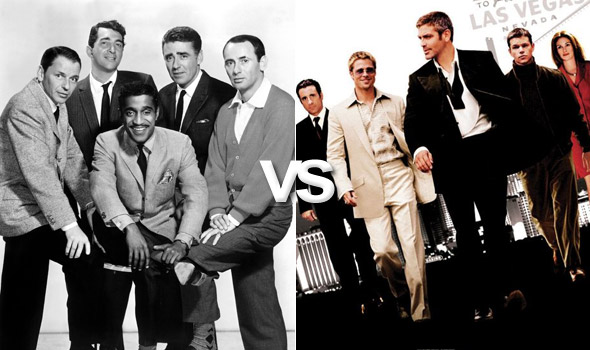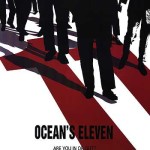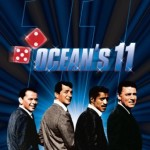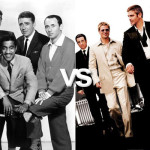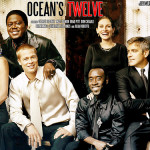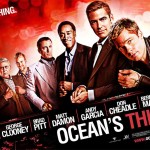Carry On 31, Bond 23, Charlie Chan, Abbott and Costello, Jaws, Rocky, Indiana Jones, Shrek, Bourne, Harry Potter… it doesn’t matter when or where you look, wherever movies are made, there are franchises. This not necessarily the same as sequels, which may be the continuation of an adapted storyline (as with Potter series, which do indeed follow the story from beginning to end in 8 movies, but qualify as a franchise on exploitative branding grounds.)
A franchise more generically is a rehash of a successful movie using the same ingredients and, by and large, the same principle characters, in order to cash in on the audience who loved the first in the series, and to disguise the paucity of imagination among the movie makers. For that to succeed you need a formula, a style, likeable characters, a halfway decent plot and script, and a tagline on which to market a brand.
In the case of the Oceans franchise, the initial raw material was, you may recall, a 1960 Ratpack movie starring Sinatra (as Danny Ocean), Martin, Davis Jr, Lawford, Bishop and, as the token female interest, Angie Dickinson, which characters and more form a syndicate of 11 to rob five Las Vegas casinos of what now seems a paltry sum. It was built around the ratpack in-jokes and did quite well in its day. Ripe for the plucking, you might say.
The initial remake of Ocean’s Eleven in the capable hands of Steven Soderbergh, gathered together an excellent cast around the charm and selling power of George Clooney (as Danny Ocean) and an entirely new cast of characters led by Brad Pitt and Julia Roberts (as Ocean’s ex-wife Tess.) Fine actors all, though you do wonder about some of the characters – not least the dodgy cockney accent adopted by the excellent Don Cheadle, which becomes progressively more American by the end of the series.
The ingredients are not hard to spot: it’s a fast-paced action tale, packed with jovial repartee and high-tech gadgetry to a backing track of funky music and multi-screen shots. You miss some of the detail along the way, but get this – it doesn’t matter since you will buy the DVD and watch it again. Easy-to-like, good fun, baddies-as-goodies fun with a twist, the twist being that there is one little component of the storyline they didn’t tell you, ready for the flashback when you think the team will be captured or fail to break the bank.
By contrast, Andy Garcia is the goody-as-baddy ruthless casino owner Terry Benedict who so deserves to be robbed. Whoever really owns the Bellagio, MGM Grand and Caesar’s Palace (for it is not Mr Garcia) must have been chortling at all the wonderful publicity. He thinks his security is foolproof, but by a combination of technology and human fallibility that proves otherwise. Try doing that heist for real though!
So, having assembled these lovely people and made lots of money in the process, what are you going to do about it? Why, obviously you are going to dream up another movie plot for them, then another. But with each sequel the laws of movie nature mean you will develop a bad case of diminishing returns, and not simply financial either. Each will be compared unfavourably with the former, and each will look increasingly tired the more ingredients you hurl at it.
So rule no 1 of the franchise game is this: know when to stop. Rule no 2 is that age-old showbiz maxim: leave ’em wanting more… unless you can succeed in reinventing the character and the series entirely, much as the Bond team did with Daniel Craig at the helm, and indeed Dr Who with the arrival of Stephen Moffatt.
In this case, three movies was plenty, but even then they become weighed down by their own self-congratulatory Hollywood in-jokes. For example, in Ocean’s Twelve, no 2 in the sequence, the big joke is that Julia Roberts plays Tess Ocean plays Julia Roberts, with hubby Bruce Willis making a cameo as himself. I felt myself shudder at that one.
Ah, but maybe it doesn’t matter when you have another sprinkle of stardust with the addition of the wonderful Vincent Cassel as super-villain The Night Fox and Catherine Zeta-Jones as a Machiavellian cop, plus Jeroen Krabbé, Robbie Coltrane, Eddie Izzard, Albert Finney, Uncle Tom Cobley and all – though for my money Cherry Jones playing Matt Damon’s mother steals the show. Add a touch of Amsterdam, Paris and Lake Como to the mix and the romance runs free. Except that the script follows a very similar pattern to the first, but for the fact that there are two heists here.
So what would they come up with for the third chapter, the cheeky monkeys? This time it’s a highly unlikeable hotel and casino owner by the name of Willy Bank, played with relish by Al Pacino, who makes the big mistake of screwing around with business partner Reuben Tishkoff (Elliott Gould, about as far over the top as it’s possible to go without falling over.) Since Reuben is one of the gang, Ocean’s Thirteen is born as a means of gaining revenge – this time with the financial and spiritual aid of Terry Benedict.
But you know the boys (this time without la Roberts) will win out in the end, as surely they always will. That’s the point really: stick to the formula and it becomes predictable and (whisper it) dull, no matter how much whizzy cutting, however many big names, however many cunning stunts you pull off. So Clooney, Pitt et al hung up their boots and moved on to pastures anew. I doubt if any of them suffered from the retirement of Ocean and his crew.
No doubt plenty of people will have seen and enjoyed the three movies, though personally I would rather have found more inventive and less derivative ways to use the talents of the cast. But then, money talks loudest to a Hollywood studio boss. If you’re making money, what do you care how you’re making it?

